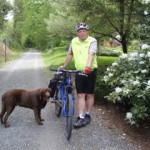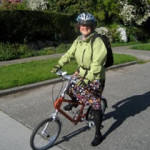The answer to the question in the title above–Will the State Senate vote to help slow traffic in your neighborhood?—is “It depends.”
It depends on you taking action right now to ask your state senator to vote yes for SB 5066, our Neighborhood Safe Streets Bill.
SB 5066, the Neighborhood Safe Streets Bill, should be coming to the floor of the Senate for a vote in the next day or so. Its companion bill, HB 1045, recently passed the House with strong bipartisan support, 86-10. It’s time to ask your state senator to vote yes for safer streets, less red tape, and cost savings for taxpayers.
SB 5066 is simple: It allows cities to save our tax dollars by letting them slow speed limits on non-arterial streets to 20 mph without having to spend money on a traffic and engineering study, as long as they set up a procedure for decision-making on the change.
Safer streets: When you, your neighbor’s child, or your grandmother gets hit by a motor vehicle at 25 miles per hour (the de facto speed limit on many non-arterial streets) versus 20 miles per hour the consequences are far more serious. This is especially true for the elderly.
According to a 2011 report by AAA, a person’s chance of being severely injured sharply increases as vehicle speeds increase (odds of serious injury go from 10% at 16mph to 50% at 31mph). The risks are far greater for older people. This is why AARP strongly supports SB 5066.
An additional study shows the chances of death at 5% when you’re hit at speeds of 20 MPH, versus a 45% likelihood of death when you’re hit at 30 MPH.
Safe, walkable streets are important for safety and livability, and they improve the quality of our schools and neighborhoods—this is why so many of the partners we work with on Safe Routes to School support this bill.
Less red tape and cost savings for taxpayers: Cities already have traffic and transportation plans in place developed with the expertise of professional engineers. They already have the power to lower the speed limit to 20mph. They just can’t lower it without doing another study.
The Washington State Association of County Engineers estimate the cost of such studies at $1,000 to $5,000 for jurisdictions that can assign the studies to staff in-house, with costs higher for smaller jurisdictions that have to employ outside consultants. SB 5066 would let cities spend that money on actually making safety and traffic improvements instead of conducting yet another study. This is why the Association of Washington Cities and several individual cities support the bill.
You’re with us on this. Now what?
Contact your legislator. Enter your mailing address on the district finder form (choose Legislative, not Congressional) and follow the instructions on the site to reach a contact form.
Choose your state senator and ask for a YES vote on the floor for SB 5066.
Points you could include in your email:
- HB 1045 is about local control, increasing government efficiency by cutting red tape and expense, and making neighborhood streets safer.
- HB 1045 has bipartisan support. The Senate bill (SB 5066) passed out of the Senate Transportation Committee with unanimous “do pass” support. The House companion bill (HB 1045) recently passed the House 86-10. In the previous biennium, this same legislation passed out of the House twice. This is the year to get it done!
- HB 1045 can save cities and towns money by removing the requirement for an engineering study. It’s smart policy that removes unnecessary regulation over a decrease of 5mph. This change lets cities spend that money on actually making safety and traffic improvements instead of conducting yet another study.
- The elderly are most vulnerable to collisions at speeds above 20 MPH. As we look to create safe neighborhoods for our increasingly elderly population, slower streets are more forgiving to those whose mobility is affected by the highly individual process of aging. Design practices that explicitly recognize aging will better serve a growing segment of the nation’s population.
- Safe, walkable streets are important for safety and livability, and they improve the quality of our schools and neighborhoods—so kids can walk and bike and so parents can feel safe sending their kids to school.
- This bill could be an especially helpful tool in the toolbox of cities and towns to reduce cut-through traffic on neighborhood streets off of arterials and onto non-arterial streets, which affects property values, safety, and livability in cities and towns across Washington.
Our Legislation & Statewide Issues page lists the issues and bills we’re following so bookmark that, follow us on Twitter, like us on Facebook, and ask your friends to sign up for our email Action Alerts to keep pace with the session as it speeds up.
Stay tuned and stay active!
Earlier Action Alerts give you more background on the bill’s progress and other issues:
- Keep Your Eyes on the Prize: it’s Time to Go Get the Transportation Investments We Need
- Neighborhood Safe Streets Bill Needs You in the House
- Neighborhood Safe Streets Bill: Second Gear, Second Committee Hearing
- Neighborhood Safe Streets Bill: First Gear, First Committee Hearing
- Take Action for Safer Neighborhood Streets
- Love Bikes? Take Action During Valentine’s Week!
- Week 3 Legislative Update




3 Trackbacks
[…] and ask for a YES vote on the floor for HB 1045. Use what you’ll find in our last blog post, Will the State Senate Vote to Help Slow Traffic in Your Neighborhood? and stress these […]
[…] Will the State Senate Vote to Help Slow Traffic in Your Neighborhood? | Bicycle Alliance of Washingt… […]
[…] Will the State Senate Vote to Help Slow Traffic in Your Neighborhood? | Bicycle Alliance of Washingt… […]